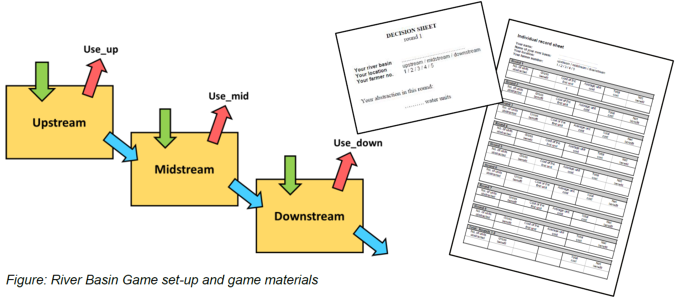Games are powerful tools in education and management support to offer participants the opportunity to conceptualize management problems, to reflect on behavioral choices or to train decision making. The River Basin Game (Hoekstra, 2012) represents themes of over-abstraction, short-term vs long-term management and individual vs collaborative goals in decision making in water resources management. The game is played dozens of times in MSc courses at the UT and other educational and professional settings.
To make games successful, the main choice dilemma’s should naturally emerge and the schematization of the system managed should be recognizable (Ewan and Seibert, 2016). A model-based schematization does not need to be fully realistic, but represent basic characteristics of the real-life system sufficiently well to make experiences in the game transferrable to lessons-learnt for real-life management (Rodela et al., 2019). In the River Basin Game, a simple model of the water balance and water use costs of the subbasins is used to schematize the system.
Where participants play a game to achieve a perceived best outcome, formal optimization techniques can determine optimal strategies and outcomes (Musah et al., 2020).
In the River Basin Game, these optimal strategies have strange features of high interannually variable water uses that do not connect to intuitive expectations of best management practices; this might leave players with unintended experiences and spurious lessons learnt. The reason for the strange features or their persistence under changing game settings is unknown, and can be sought in specific choices in the representation of the water balance or the costs of water use.
In debriefing discussion that close game sessions, often various restrictions to water use or compensation mechanisms between subbasins are suggested to create incentives to avoid the tragedy of the commons, and sometimes such mechanisms are informally introduced during game-play (Hoekstra, 2012). The influence of such restrictions or mechanisms on optimal resource use and its distribution over the basin is unknown.

Research objective
The research objective of this project is to diagnose the appearance of highly interannually variable optimal water use in the River Basin Game, and to design and assess alternative game set-ups to overcome this feature and to include restriction rules or compensation mechanisms moderating appropriate water use.
Approach
The work will consist of the following steps:
- Set-up an optimization model seeking optimal game-playing strategies; Matlab or Python, and optimization toolboxes for these programming platforms/languages can be used.
- Analyse for which range of parameters or settings in the game high variability is strategies takes place.
- Diagnose the sensitivity of optimal strategies to alternative game formulations including sub-basin compensation rules.
- Assess alternative game set-ups for their use as educational game, using both desk research and game testing. Depending on timing, educational sessions of relevant MSc courses may be available for game testing with student groups.
A selected alternative game set-up is intended to be used in, at least, future UT MSc education on water resources management and optimization methods.
References
- Ewen, T., and Seibert, J. (2016) Learning about water resource sharing through game play, Hydrology and Earth System Sciences, 20(10): 4079-4091. DOI: 10.5194/hess-20-4079-2016.
- Hoekstra, A.Y. (2012) Computer-supported games and role plays in teaching water management, Hydrology and Earth System Sciences, 16(8): 2985-2994. DOI: 10.5194/hess-16-2985-2012.
- Musah, I., Boah, D.K., and Seidu, B. (2020) A comprehensive review of solution methods and techniques for solving games in game theory, Journal of Game Theory, 9(2): 25-31. DOI: 10.5923/j.jgt.20200902.01.
- Rodela, R., Ligtenberg, A., and Bosma, R. (2019) Conceptualizing Serious Games as a Learning-Based Intervention in the Context of Natural Resources and Environmental Governance, Water, 11(2): 245. DOI: 10.3390/w11020245.



